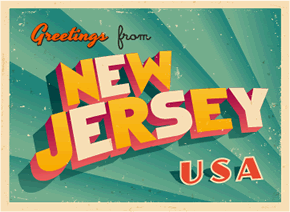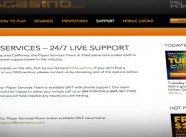The Advantages of Regulated Sites Over Unregulated Sites
April 30, 2013 marked a historic day for proponents of state regulated Internet gambling. For the first time in real-money online poker’s fifteen year history, residents of Nevada could deposit money onto an iGaming site without having to worry about payment holdups and the possible legal repercussions of their actions. Since, Delaware and New Jersey have readied iGaming operations of their own, with other states likely soon to follow.
Regulated iGaming sites offer several distinct advantages over their unregulated counterparts. One needn’t look further than the ongoing Full Tilt Poker fiasco to understand just how dangerous playing on an unregulated poker site can be. And while that hasn’t stopped dozens of post-Black Friday gambling sites from attracting players from the States, a significant portion of these players have ultimately ended up regretting their dubious decision.
With regulation comes enhanced player protection, which in turn leads to a more gratifying player experience. Listed below are several ways in which playing on a regulated site is advantageous to depositing funds onto an unlicensed US-facing skin.
Faster, more reliable payouts
Post-Black Friday online poker players care less about VIP structures, the quality of their opponents and deposit options than they do about speedy withdrawals. As evident by John Mehaffey’s monthly payment processing report, unlicensed sites vary widely in the amount of time required to make good on pending payout requests. Compounding matters further are the hefty processing fees and limited retrieval options associated with withdrawals. And even if a player does receive a check in a timely fashion, there’s no guarantee that it won’t bounce.
That’s not to say offshore Internet gambling sites like Bovada don’t boast very good withdrawal times. It’s just that even the very best US-facing sites leave their patrons vulnerable.
Take former Revolution skin Lock Poker for example. In June 2012, the same month Lock purchased the Cake Poker network and re-branded it as Revolution Gaming, Lock was delivering checks in approximately 4-6 weeks and handling cash transfers in about two – nowhere near ideal, but not terrible considering the limited options available to US-based online poker players.
Since, payout times have ballooned to an average of three months or more. According to Two Plus Two forum user IHasTehNutz’s regularly updated spreadsheet, as of late-October 2013 over 160 Lock Poker players are owed a total of over $430,000, with the oldest outstanding payout requests dating back almost one year. Lock has recently left the Revolution network in favor of an independent poker platform.
Regulated iGaming laws provide assurance that payouts will be handled in a fast, reliable manner. In addition to laws requiring sites to provide estimated payment windows, New Jersey casinos are required to “maintain a New Jersey bank account separate from all other operating accounts to ensure the security of funds held in patron Internet gaming accounts,” effectively eliminating the risks associated with offshore banking.
More vigorous identification verification
Well-regulated gambling sites impose more comprehensive identity verification techniques than unlicensed ones. Some would even argue that virtual casinos presided over by state officials are better equipped to monitor scrupulous behavior than land-based brick and mortar casinos.
For example, in order to register for an online account in New Jersey, players must first provide the site with a variety of sensitive information including the last four digits of their SSN or taxpayer ID. The patron’s information identity is then verified in accordance with regulations set forth by the state.
In addition, New Jersey registrants are subject to “multi-factor authentication,” meaning that their identity will be verified across existing “third-party and governmental databases.” They’ll also be required to set up a PIN number and provide answers to challenge questions.
Only one account per player is allowed, and the individual in charge of the account must prove that they are at least 21 years of age. Player location is tracked via sophisticated geo-location verification, ensuring that the player is physically located within New Jersey’s boundaries before allowing them to partake in real-money gambling activities.
To the contrary, unregulated sites employ noticeably less rigid player verification practices. Although the information required to set up an account varies from site to site, overall, the identification verification process on an unregulated site is significantly less exhaustive and exact than its regulated counterpart.
Self-imposed restrictions
Gamblers can be their own worst enemy. Without an option to curtail the amount of time and money spent playing online, an expensive hobby can quickly escalate into a crippling disease. Some unregulated sites are beginning to offer a self-exclusion option, but rarely do they allow players to set daily and weekly limits for themselves.
One of the biggest benefits of playing on an online gambling site is that the regulator can track and monitor a player’s gambling tendencies. But what good is data mining if the operator doesn’t use the information available to prevent players from becoming self-destructive?
New Jersey will place anyone that submits a self-exclusion request on a special self-exclusion list. Players are permitted to exclude themselves from Internet gambling, live casino gambling, or both. In addition, each site is responsible for offering players the option to set daily, weekly and monthly deposit limits. Time-based limits, offered on a daily basis, will be offered as well. Of course, if players are participating in a hand or a tournament, they will be permitted to finish.
Suitability requirements
Before awarding an applicant an online gaming license in New Jersey, the applicant must pass the Division of Gaming Enforcement’s strict suitability requirements. All too often, unregulated sites are run by unsavory figures or scrupulous companies. By enforcing minimum requirements for entry, New Jersey officials are able to successfully weed out any operator of questionable character.
Although New Jersey does not have a bad actor clause, many foreign operators have been discouraged by its stringent set of requirements. Others, like PokerStars, are having an exceedingly difficult time receiving a license.
While NJ’s suitability requirement may keep some of the biggest online poker and casino sites from ever setting up shop in the Garden State, they promote player protection – one of the primary reasons why the idea of state regulated gambling become so popular among gambling proponents in the first place.
Regulation has positive effects
According to a report published in June 2013 by Arjel, since France introduced regulated online gambling, the “proportion of problem gamblers in online gambling is down from 8.3% in 2010 to 6.6% in 2012.” Furthermore, the percentage of moderate-risk gamblers dipped from 14.4% to 10.4% over the same two year period.
If that doesn’t prove the merits of a regulated online gambling system, nothing will.
To read more about New Jersey’s iGaming laws, you can find the latest set of regulations here.






